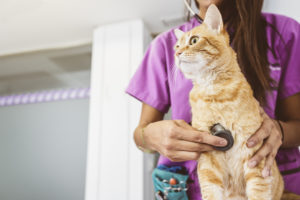12:30 pm
 We hear a lot about heart disease because it is common in humans, but did you know that it can also affect your pet? Both dogs and cats can also suffer from heart disease, which leads to congestive heart failure. Fortunately, pets can live for years with heart disease when receiving proper treatment. AERA wants all pet owners to be able to recognize the signs of heart disease as well as understand the disease.
We hear a lot about heart disease because it is common in humans, but did you know that it can also affect your pet? Both dogs and cats can also suffer from heart disease, which leads to congestive heart failure. Fortunately, pets can live for years with heart disease when receiving proper treatment. AERA wants all pet owners to be able to recognize the signs of heart disease as well as understand the disease.
Heart disease is the name for a variety of conditions that affect the heart. Heart disease can affect several aspects of the heart, including:
While congenital heart disease develops before birth, acquired heart disease is most common in middle to older age dogs and cats but can occur in all ages.
Preventative care is the best thing you can do for your pet. One easy way to prevent some forms of heart disease is to make sure your pet is always up-to-date with heartworm prevention. You will want to bring your pet into the veterinarian for an exam at least once a year until the age of about eight or so. However, after this point, you will want to start coming in for these physical exams at least twice a year. Catching heart disease early is the best way to prevent damage from heart disease.
While heart disease can feel like a scary prognosis because it can’t be cured, it is manageable. With the help of a veterinary cardiologist, your dog or cat can live a happy, healthy life.
The common symptoms of heart disease in cats and dogs include:
In cats, you will also notice that your cat has a tendency to hide when injured or ill. The same goes for cats with heart disease.
To be diagnosed, your veterinarian may need to perform several tests on your pet which may include blood and urine tests, auscultation (listen to the heart with a stethoscope), chest x-rays, an electrocardiogram (ECG), and/or an ultrasound (echocardiogram). These tests allow the veterinarian to assess the condition of the heart and determine what is going on in your pet.
If your pet is diagnosed with heart disease, you should take him or her in to see a veterinary cardiologist. In conjunction with your primary care veterinarian, a veterinary cardiologist can help develop a routine that will keep your pet at its healthiest. A recent study in dogs documented that those with congestive heart failure who see both a primary care veterinarian and a veterinary cardiologist live 75 percent longer than those who don’t get proper heart care.
Since heart disease can’t be cured, it is important to get your pet on a regimen approved by a veterinary cardiologist. Often, a veterinarian will want to switch your dog or cat to food that is low in sodium to help reduce fluid build-up in the heart. Your pet’s cardiologist may also give you a list of approved treats and human foods that are safe for your dog or cat.
Along with diet, your veterinary cardiologist might recommend medications and supplements. Angiotensin-converting enzyme inhibitors (ACE inhibitors) can help improve symptoms of heart disease.
Like with most other diseases, certain breeds of cats and dogs are more susceptible to heart disease than others.
Have two lists two most common forms of heart disease are chronic valvular disease and primary heart muscle disease
The most common forms of heart disease are chronic valvular disease and primary heart muscle disease.
Dog breeds that are the most prone to chronic valvular disease include:
Dog breeds that are most prone to heart disease include:
In cats, hypertrophic cardiomyopathy is the most common form of heart disease. Cat breeds most likely to be affected by heart disease include:
If your dog or cat has been diagnosed with any form of heart disease, working closely with a veterinary cardiologist can improve quality of life and even lengthen the projected lifespan. AERA’s cardiology team has seen many cases of heart disease. Every pet is different, so treatment plans are different for all pets.
If you live in the Fairfield, New Jersey area and you’re looking for a board-certified cardiologist for your pet call AERA today at 973-788-0500. We would love to make an appointment for you to speak with our experienced cardiologist.